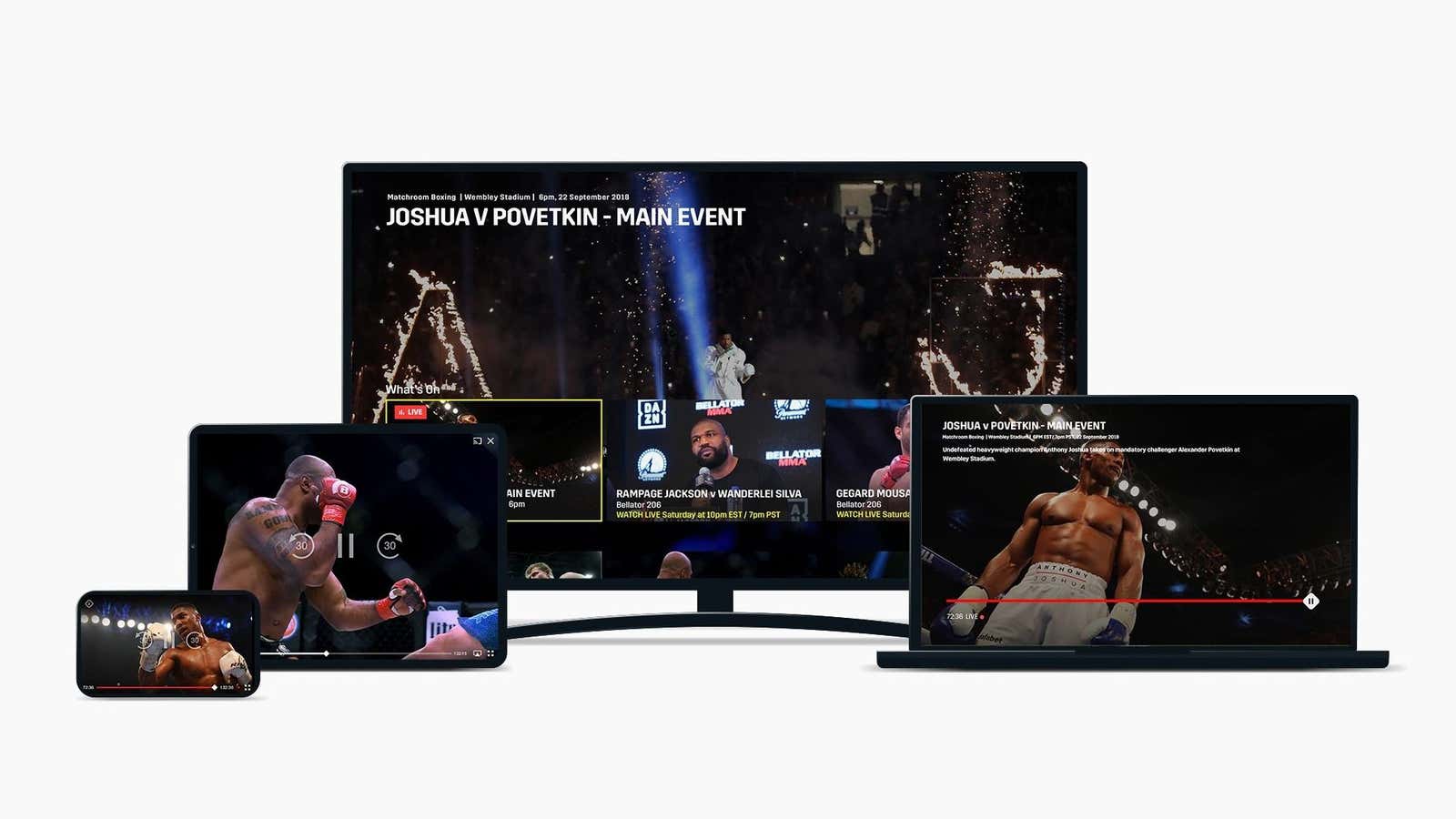Live sports are about the last thing holding the traditional ad-supported TV ecosystem in place in the US. Sports are one of the few programs US audiences still watch live, and TV networks depend on the advertising revenue they bring in. A new streaming service wants to blow that model up.
Dubbed the “Netflix of sports,” DAZN (pronounced, “Da Zone”) launched a $9.99 monthly subscription offering in the US on Sept. 10, offering live and on-demand sports streams without the commercials. Instead of relying on advertising, like its rivals ESPN+ and Turner’s Bleacher Report Live do, DAZN plans to sustain itself on subscription fees. The platform, which first launched overseas in 2016, is backed by parent Perform Group, a UK-based sports media company that hired former ESPN president John Skipper as its executive chairman in May.
“We’ve seen Netflix build a model without advertising based on the subscription,” Marcus Parnwell, director of product at DAZN, told Quartz. “Sport has more natural breaks in play, especially US sports are built for advertising. We’re trying to do a different model and a different thing.”
DAZN, which carries different sports in each of the seven countries it operates in, including Germany and Japan, only airs ads it receives from the rights-holder when it is contractually obligated to—such as in Canada where it streams NFL games—but it does not sell ads. Parnwell said those instances were fairly rare.
Still, US sports, as Parnwell said, are built for advertising. It’s why networks like Disney and NBC can afford to shell out millions for the broadcast rights. Advertising fills the gaps between clock stoppages, huddles, and other pauses in NFL games, which contain 16 commercial breaks per game. The NBA requires each timeout in its games to be 75 seconds long to accommodate advertising.
DAZN is looking at other ways to fill the breaks in the action. Its parent company, Perform, produces sports broadcasts. And during the boxing and MMA fights DAZN carries, it plans to stay in the ring or octagon with the fighters and get a peak at their strategies, for example. It also produces data packages that analyze the events, and promotes other programming during that time.
The service is launching in the US with fight sports—a category typically televised both with commercials on network TV and without on pay-per-view channels—including Matchroom Boxing, mixed-martial arts from Viacom-owned promotor Bellator, and the World Boxing Super Series.
DAZN isn’t the only one interested in fight sports. ESPN recently inked a deal to stream matches from UFC, Bellator’s top competitor, on ESPN+. And an amateur boxing match between two YouTube personalities earned a stupid amount of money from $10 pay-per-view streams on YouTube last month.
DAZN’s edge over its competitors, it said, is that it doesn’t save its best stuff for TV. All of its programming is designed for and distributed via its streaming service. ESPN, on the other hand, puts some UFC fights on its TV channels and others on ESPN+.
Like Netflix, DAZN also uses data to identify underserved audiences for sports it can buy the rights to, such as rugby, which has a small but thriving fanbase in Canada, and horse dressage in Germany.
It probably won’t build a Netflix-sized audience with its hodgepodge of sports rights. But it’s biding time and building a name for itself until 2021 and 2022, when the streaming rights for the big four professional US sports—the NFL, NBA, MLB, and NHL—are up for renewal. That’ll set off a feeding frenzy, as legacy players entering the streaming space, like Disney, Turner, and CBS, vie for the rights alongside tech companies like Amazon and Facebook that have dabbled in live sports.
